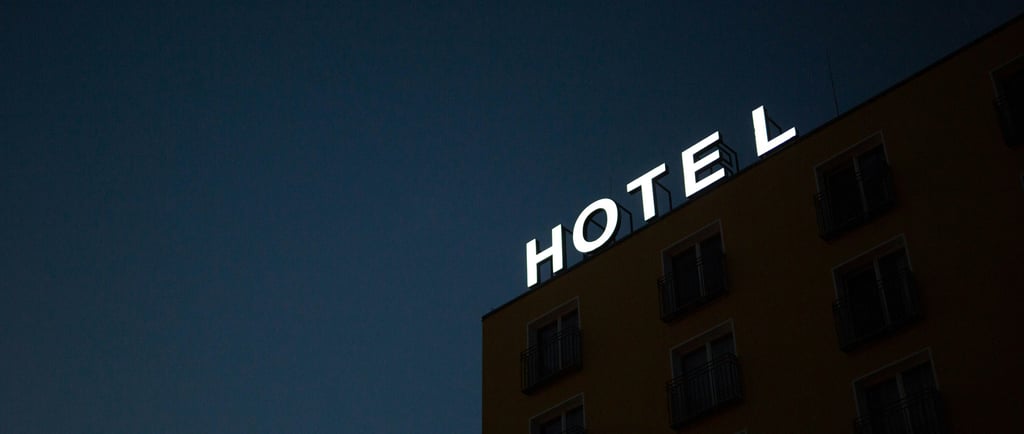Fueling Growth in the Hospitality Industry: Digital Marketing Strategies for Hotels
In the competitive landscape of the hospitality industry, hotels must harness the power of digital marketing to attract guests, drive bookings, and stand out from the competition. With travelers increasingly relying on the internet to research and book accommodations, having a strong digital presence is essential for hoteliers looking to thrive in today's digital age. In this article, we'll explore how hotels can leverage digital marketing strategies to fuel growth and achieve success.
4/25/20243 min read


In the competitive landscape of the hospitality industry, hotels must harness the power of digital marketing to attract guests, drive bookings, and stand out from the competition. With travelers increasingly relying on the internet to research and book accommodations, having a strong digital presence is essential for hoteliers looking to thrive in today's digital age. In this article, we'll explore how hotels can leverage digital marketing strategies to fuel growth and achieve success.
1. Enhancing Online Visibility with SEO
Search engine optimization (SEO) is critical for hotels looking to improve their online visibility and attract more guests. By optimizing their website for relevant keywords and phrases related to their location, amenities, and target audience, hotels can improve their rankings in search engine results pages (SERPs) and drive organic traffic to their website. This includes creating high-quality content, optimizing meta tags and descriptions, and building backlinks from reputable sources.
2. Utilizing Paid Advertising Channels
Paid advertising channels like Google Ads, Bing Ads, and social media advertising offer hotels the opportunity to reach a highly targeted audience and drive bookings. By investing in pay-per-click (PPC) campaigns, hotels can bid on relevant keywords and target specific demographics, interests, and behaviors to ensure their ads are seen by the right people at the right time. Additionally, retargeting campaigns can help hotels re-engage with website visitors who have shown interest in booking but haven't yet converted.
3. Leveraging Social Media Marketing
Social media platforms like Facebook, Instagram, Twitter, and Pinterest provide hotels with powerful tools to engage with potential guests, showcase their property, and drive bookings. Hotels can create visually appealing content, share guest testimonials and reviews, and run targeted ad campaigns to reach travelers in the inspiration and planning stages of their journey. Additionally, social media platforms offer opportunities for user-generated content, allowing hotels to leverage guest photos and experiences to showcase their property and amenities.
4. Optimizing the Guest Experience
Digital marketing isn't just about attracting new guests—it's also about enhancing the guest experience and fostering loyalty. Hotels can leverage digital technologies to streamline the booking process, provide personalized recommendations and offers, and communicate with guests before, during, and after their stay. By implementing tools like chatbots, mobile apps, and email marketing automation, hotels can provide a seamless and personalized experience that keeps guests coming back.
5. Embracing Visual Content Marketing
Visual content is key to capturing the attention of potential guests and showcasing the unique features and amenities of a hotel. High-quality photos, videos, and virtual tours can give travelers a glimpse into what they can expect during their stay and help them make informed booking decisions. Hotels should invest in professional photography and videography to create visually stunning content that highlights their property's best features and sets them apart from the competition.
6. Encouraging Guest Reviews and Testimonials
Online reviews and testimonials play a crucial role in shaping travelers' perceptions and influencing their booking decisions. Hotels should actively encourage satisfied guests to leave positive reviews on popular review sites like TripAdvisor, Google My Business, and Yelp. Additionally, hotels can leverage user-generated content from social media platforms to showcase authentic guest experiences and build trust with potential guests.
7. Offering Special Promotions and Packages
Special promotions and packages are effective tools for hotels to attract guests and drive bookings during slower periods or special occasions. Hotels can create targeted offers and discounts for specific demographics or segments, such as families, couples, or business travelers. By promoting these offers through digital marketing channels like email campaigns, social media ads, and website banners, hotels can incentivize bookings and maximize occupancy rates.
8. Providing Local Area Information and Recommendations
Many travelers are interested in exploring the local area and experiencing nearby attractions, restaurants, and activities during their stay. Hotels can leverage digital marketing to provide guests with valuable information and recommendations about things to see and do in the area. This could include creating blog posts, guides, and interactive maps highlighting local attractions, dining options, and events to help guests make the most of their visit.
9. Monitoring and Analyzing Performance Metrics
As with any digital marketing strategy, it's essential for hotels to monitor and analyze performance metrics to measure the effectiveness of their efforts and make data-driven decisions. Hotels should track key metrics such as website traffic, booking conversions, revenue generated from digital channels, and guest satisfaction scores. By analyzing these metrics, hotels can identify areas for improvement and optimize their digital marketing strategy to drive better results.
Conclusion: Driving Growth Through Digital Marketing
In today's competitive hospitality industry, hotels must leverage digital marketing strategies to attract guests, drive bookings, and differentiate themselves from the competition. By enhancing online visibility with SEO, utilizing paid advertising channels, leveraging social media marketing, optimizing the guest experience, embracing visual content marketing, encouraging guest reviews and testimonials, offering special promotions and packages, providing local area information and recommendations, and monitoring and analyzing performance metrics, hotels can fuel growth and achieve success in the digital age. With the right digital marketing strategy in place, hotels can attract more guests, increase occupancy rates, and create memorable experiences that keep guests coming back again and again.

